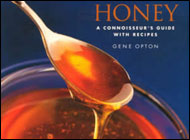Honey adds health benefits, is natural preservative and sweetener in salad dressings
Antioxidant-rich honey is a healthy alternative to chemical additives and refined sweeteners in commercial salad dressings, said a new University of Illinois study.
“To capitalize on the positive health effects of honey, we experimented with using honey in salad dressings,” said Nicki Engeseth, a U of I associate professor of food chemistry. “We found that the antioxidants in honey protected the quality of the salad dressings for up to nine months while sweetening them naturally.”
Engeseth’s study substituted honey for EDTA, an additive used to keep the oils in salad dressings from oxidizing, and high-fructose corn syrup, used by many commercial salad-dressing producers to sweeten their salad dressing recipes.
“We chose clover and blueberry honeys for the study after an analysis of the sweetening potential, antioxidant activity, and phenolic profiles of 19 honeys with varying characteristics,” said the scientist.
The dressings were also compared to a control dressing that contained ingredients found in current commercial salad dressings, she said.
Engeseth explained a problem the scientists encountered in using honey in a salad dressing system. “Salad dressings are emulsions—they contain oil and water; and to keep these ingredients together in one phase, manufacturers rely on emulsifiers and thickening agents to avoid thinning of the dressing and separation of the oil and water phase,” she said.
 When the researchers found that enzymes in the honey broke the emulsion by attacking the starch that was used to thicken the dressing, they came up with a new formulation that used xanthan gum as a thickening agent, which they then used in all the dressings, she said.
When the researchers found that enzymes in the honey broke the emulsion by attacking the starch that was used to thicken the dressing, they came up with a new formulation that used xanthan gum as a thickening agent, which they then used in all the dressings, she said.
The researchers then stored the dressings under various conditions, including 37 degrees Celsius (accelerated storage) for six weeks and 23 degrees Celsius and 4 degrees Celsius for one year, followed by an evaluation of their oxidative stability.
“After nine months of storage, both types of honey were as effective as EDTA in protecting against oxidation or spoilage. Blueberry honey performed slightly better than clover,” she said.
Engeseth said that many consumers prefer products with natural ingredients and that salad dressings made with honey should appeal to these consumers.
“There’s such a wide range of salad dressings on the market-some unique salad dressings as well as inexpensive products that perform beautifully. If manufacturers are interested in developing salad dressings that have a healthy twist, we’ve demonstrated that using honey as both an antioxidant and a sweetener is one way to do this,” she said.
###
The article was published in the Journal of Agricultural and Food Chemistry. Co-authors are Carolyn Rasmussen of Kraft Foods, Sophia Leung of Newlywed Foods, Lia M. Andrae-Nightingale, a former U of I graduate student, and Xiao-Hong Wang and Shelly J. Schmidt of the University of Illinois.
Contact: Phyllis Picklesimer
.(JavaScript must be enabled to view this email address)
217-244-2827
University of Illinois at Urbana-Champaign